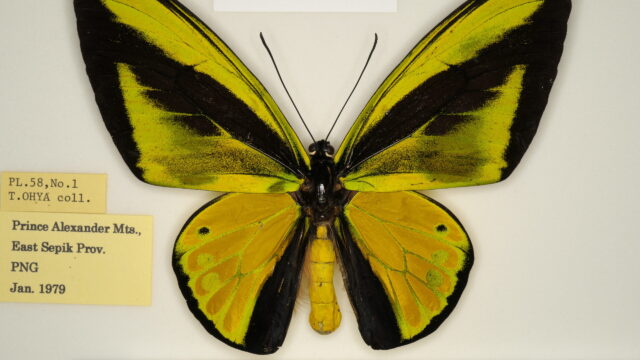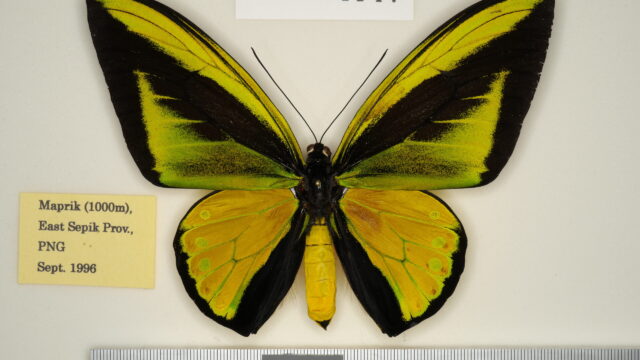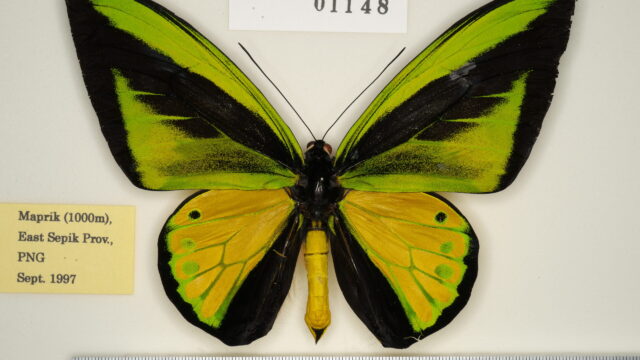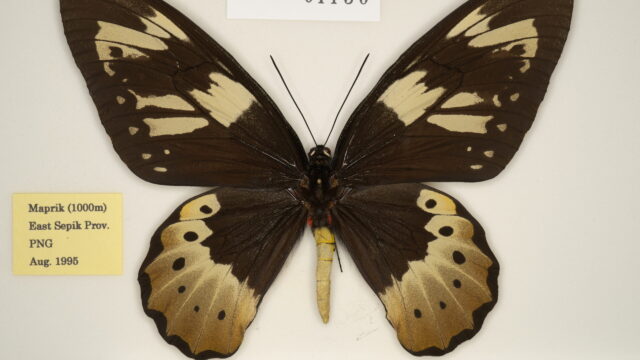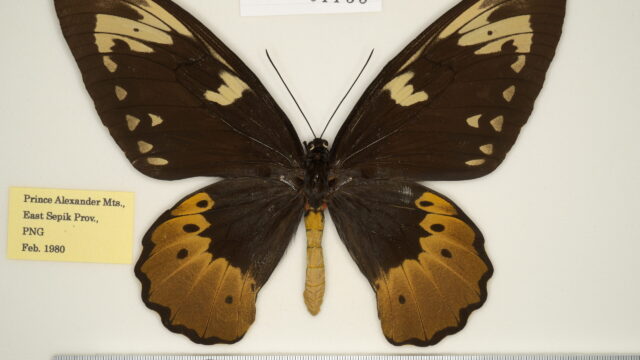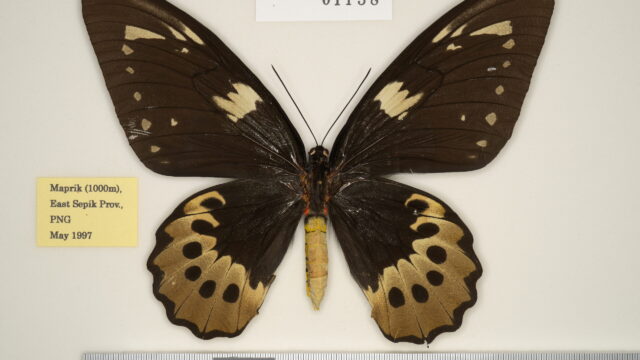- Ssp. supremus (Röber, 1896)19) [♂][♀: elisabethae-reginae (Horváth & Mocsáry, 1899)10)]
= elisabethae-reginae (Horváth & Mocsáry, 1899)10) (N. of PNG)
(Distribution) [Map 57]
INDONESIA [Irian Jaya] Jayapura, Arso; PNG [WSP] Vanimo Valley, Bewani, Torricelli Mts. (Yili), [ESP] Prince Alexander Range, Maprik, [MgP] Ramu River basin. Adelbert Range, Astrolabe Bay area (Stephansort, Bogadjim, Ileg, Bongu, Konstantinhafen, Dumun), Finisterre Mts., [MoP] Huon Peninsula (Saruwaged Mts., Sattelburg, Finschhafen, Simban, Bulum (=Mongi) River basin, Lae), Markham River basin.
(Episodes of discovery and original description)
In January 1896, C. Wahnes received a ♂ specimen from Bongu, near Constantinhafen, which he collected two days’ walk south. In the same year, Röber first dedicated the specimen to Wolf von Schönberg and named it schönbergi, but at the end of his paper he changed the name to supremus (from the Latin supreme, meaning “the best”) because of the presence of O. paradisea (O. schoenbergi Pagenstecher, 1893).
The first mention of ♀ is found in the paper by Horváth and Mocsáry (1899), in which they described a specimen collected by Biró near Finschhafen in 1898 and named it elisabethae-reginae.
(Characteristics)
A large sized subspecies, occurring in the north of PNG at around 1,000m altitude.
(Spotted patterns)
♂: It is characteristic that the median black patch extending from median area to the cubital band is clearly separated by the green V2nd – V4th (as in ssp. titan) on FW. Abdomen is yellow in color.
♀: On the FW, discal and submarginal spots are reduced, but cell-spot and subapical steaks are large and prominent. HW pale band is creamy and submarginal area orange yellow. Cell-spot is absent. Abdomen creamy yellow, lateroventral sides yellow with black stripes and no body hairs.
(Variation)
♂-f. kurtrunbucheri Deslisle & Sclavo, 20154): [Aberrant FW/HW pattern] Semi-translucent golden streak present basally in space 1b on FW. On HW, semi-translucent golden patches covering every space. Minute green discal spots present only in spaces 5 and 6.
♂-f. elisabethae-reginae (Horváth & Mocsáry, 1899)10): [Aberrant HW pattern] Green discal spots with complete absence of black scales on HW.
♂-f. aurifer Haugum & Low, 19798): [FW/HW discoloration] The iridescent scales strongly tinged with gold.
♂-f. sanguismaculata Deslisle & Sclavo, 20154): (➡samson )
♂-f. malummaculata Deslisle & Sclavo, 20154): [FW discoloration] Golden-green and orange bicolouration subapically and subdiscally. Moreover, presence of a red streak within the radial band subapically. (➡titan )
♀-f. schmidi Haugum & Low, 19798): [Aberrant FW/HW pattern] All pale spots except for the cell-spot are enormously enlarged. Subapical streaks are large and long, submarginal spots very large and slightly fused with three discal spots. The cell-spot is normal. Dark discal spots on HW are minute in spaces 7 – 5 and absent in the remaining spaces.
♀-f. angelicus Deslisle & Sclavo, 20154): [Aberrant FW/HW pattern] The cell-spot invasive basally on FW. On HW, pale band extended basally and an orange color without dark shading. Dark discal spots are smaller and absent in spaces 1b – 3.
♀-f. amandae Deslisle, 20042) (=huonensis Deslisle & Sclavo, 20154)): [FW/HW discoloration] Pale patches and spots on FW and HW are cream-colored.
